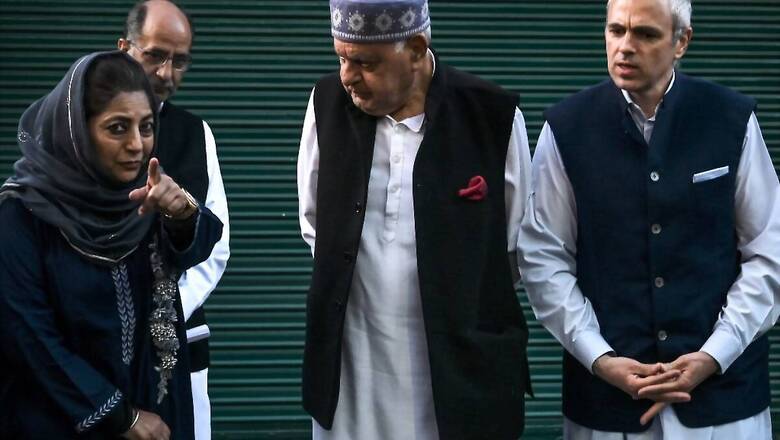
views
For the first time in many decades, Kashmir’s regional parties have teamed up, to pressurise the Centre to roll back last year’s move of withdrawing the special constitutional status of J&K.
The announcement of formation of the People’s Alliance for Gupkar Declaration, a conglomerate of six parties, came as a bid to fight for restoration of Article 370 and 35A and seek final resolution of the Kashmir issue through dialogue by inviting all stakeholders. Conglomerate politics in Kashmir is rare and only the separatists have tried it so far.
Kashmiri leaders, including three former chief ministers, had been taken out of circulation, just hours before Parliament diluted Article 370, to curb any resistance. During this time, the Valley’s politics remained frozen because the Centre did not want any opposition to its move.
Now back after detention, the Kashmiri leaders have set themselves a stiff task of fighting for the lost status, considering that the central government has said the decision is cast in stone. The strategy to achieve their objective or fight to that end is in the works.
Alliance’s limited options
Even though the first step of launching the alliance has been taken, Valley leaders say future meetings will decide upon the shape, structure, and agenda of the combine. As of now, the parties will wage a political, constitutional and legal fight to get back their rights. Currently, the case is in the Supreme Court but there hasn’t been any hearing for months.
The alliance is not averse to talks with top government functionaries if such a possibility exists, just like the Ladakh representatives had done on the issue of extending the Sixth Schedule of the Constitution in the Union Territory. The Centre was very quick to listen to the Ladakh leadership and within hours of their call to boycott the hills council elections, the BJP rushed two senior leaders to Leh. Within a few days, home minister Amit Shah held a meeting in Delhi to placate them. The Kashmiri leaders would be thinking of similar audience but are unsure whether that would happen soon given that state elections are months away.
For the time being, the alliance will spend time firming up roles and its structure and later try to reach out to the leadership in Ladakh, Kargil and Jammu where instances of public displeasure over constitutional changes have been reported. The alliance will certainly tap that sentiment to present a picture that the disenchantment is neither Kashmir nor Muslim specific and that there are similar fears when it comes to job, education and land safeguards.
Political activity revived
Meanwhile, Mehbooba Mufti’s release on October 13 has suddenly given an impetus to the political activity in Kashmir which otherwise had remained frozen in the past one year owing to the incarceration of the mainstream leaders and a large number of activists and youngsters.
The leaders, facing tremendous public mistrust over the years, will also utilise the alliance cover to regain their lost space and trust. Mehbooba Mufti and Sajjad Lone faced a lot of public ire for being part of the PDP-BJP government and Mufti’s “milk and toffee” remarks still enrage young Kashmiris.
The Abdullahs are held responsible for failing to stop the wanton killing of youngsters in the summer of 2010. By pitching the “sentiment” of Kashmiris over the two critical constitutional articles, they are in a way trying an image makeover. The Centre understands this and is giving them leeway even though a lot of criticism comes its way.
Delhi is not averse to political revival
The unity move of the Kashmir parties can be a cause of concern for the BJP government in the short term, but in the longer run it is a good news considering that New Delhi will be looking to hold elections next year. Already the government of India has faced a lot of criticism from local parties here that only the BJP and its ‘friends’ are allowed a free run while rivals are immobilised.
The China dimension
Farooq Abdullah, who is likely to head the alliance, recently kicked up a storm when he suggested in an interview that in Kashmir such was the anger on the repeal of Article 370 that people won’t mind being ruled by China. Sensing that it infuriated Delhi, the party later reframed the statement. Whether readers like it or not, the Chinese indeed have evinced a lot of interest in Jammu and Kashmir ever since the articles were struck down.
The Chinese have repeatedly questioned the August 5 constitutional changes and UT status of Ladakh. The Kashmiri leadership feels that with increased pressure from China, New Delhi might be forced to undo last year’s step. Though they have not stated so, such feelings may invite tough responses.
GOI has the key
The government of India retains the key to resolve this issue. It can engage with leaders of Kashmir (like Ladakh representatives) and try to find a solution that is a win-win for all parties. Inertia won’t help anyone.
Read all the Latest News and Breaking News here

















Comments
0 comment